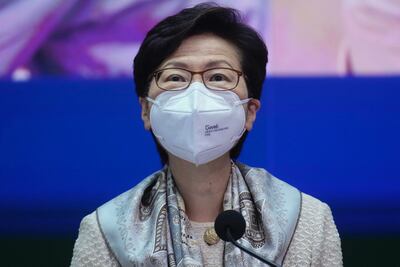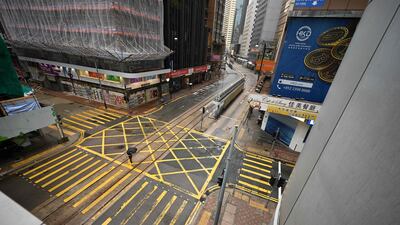Nearly half of the European companies in Hong Kong plan to fully or partially relocate operations and staff out of the city, a survey suggests, in the latest sign that the world’s toughest Covid-19 travel and quarantine restrictions are eroding the appeal of Asia’s main finance hub.
About 25 per cent of responding companies said they planned to fully relocate out of Hong Kong in the next year, a survey by the European Chamber of Commerce in Hong Kong revealed, while another 24 per cent said they are planning to partially move out of the city.
And about 34 per cent of firms said they were uncertain about their plans, while only 17 per cent said they had no desire to relocate over the next 12 months.
The negative results, which come amid a surprisingly chaotic coronavirus outbreak, are the latest measure of declining business confidence in a once freewheeling city that has been increasingly isolated from the world over more than two years.
Covid prevention measures have included hotel quarantines as long as 21 days for incoming travellers, the mandatory hospital admission of those testing positive, regardless of symptoms, and the forced isolation of close contacts in spartan government-run units.
The strict approach to Covid has unfolded alongside a national security law that has injected unprecedented levels of unpredictability into a city that was once known for stability and openness.
While a recent devastating outbreak of the Omicron variant has forced the government to relax some restrictions amid an exodus of residents, the city hasn’t given any signs that it plans to abandon the “dynamic zero-Covid” strategy it has borrowed from China. The strategy aims to fully eliminate local cases rather than risk opening up.
“Looking at the comparably overwhelming participation among our membership base, the result should serve as a stark warning that recent months and years took a toll on the European business community and their confidence,” said Frederik Gollob, the European chamber’s chairman.
“Recent announcements have provided for some relief but it has largely been perceived as too little, too late. We need a clear plan back to normal in order to create positive momentum. Reinstating Hong Kong as ‘Asia’s World City’ must be the aim going forward.”

The survey was conducted between mid-January and early February as a fresh coronavirus outbreak was gaining pace and restrictions tightened further. It had 260 respondents representing companies across more than a dozen European business chambers.
About 70 per cent of the people worked at companies with fewer than 100 employees, while about 30 per cent represented bigger firms.
Representatives for the Hong Kong government did not respond immediately to an emailed request for comment.
In recent remarks, Hong Kong chief executive Carrie Lam acknowledged that the city’s strict measures were having an impact on its weary residents as well as the finance hub’s international reputation.
“I have a very strong sense that people’s tolerance is fading,” she said on March 17.
“I have a very good feeling that some of our financial institutions are losing patience about this isolated status of Hong Kong.”

